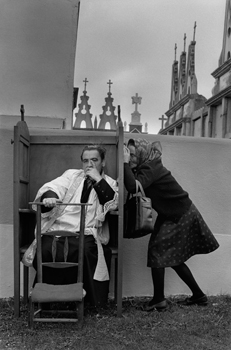
CGAC Valle Inclán s/n 15704 Santiago de Compostela Espagne
The Centro Galego de Arte Contemporánea (CGAC) and the S. A. de Xestión do Plan Xacobeo present the exhibition Transtempo, which includes a selection of images taken by Cristina García Rodero in Galicia from 1974 to the present. Through this series of photographs, presented for the first time as a structured whole, the artist offers her own personal vision of a timeless Galicia, where religion and pagan rituals intertwine in a story spanning several generations.
Born in Puertollano, Ciudad Real, in 1949, Cristina García Rodero is, undoubtedly, an indisputable reference in Spanish contemporary photography. In 2009 she became the first Spanish photographer to be admitted as a full member of the prestigious Magnum agency. Throughout her career she has received numerous awards in recognition of her work, such as the Spanish National Photography Award (2006), the Bartolomé Ros Award from PHotoEspaña (2000), and the World Press Photo Award (1993/1997/2008), among others.
As an artist, Cristina García Rodero knows that these documents do not return reality to us. They don't tell us stories and do not illustrate a specific tale. They form a meta-story that tours with interrogatory precision a certain social and geographical context, surpassing and overflowing it to always return to its original place. Along the way, we are surprised by the way in which our memory holds on to the most insignificant details to provide a break in their literal meaning. That old man who in the carnival of Verín tries to kiss a woman who doesn't even seem to pay any attention to him, the woman in a coffin, wearing a fan and dark glasses, in Santa Marta de Ribarteme, the woman proudly holding up a fish head in the Vigo fish market, the 'insurmountable' grandmother in Xende, all these figures were captured by an idiosyncratic gaze that removes them from the anecdotal and makes them eloquent paradigms of a way of celebrating life. Against death, or as Derrida would say, based on the experience of possible death. This is surely the leitmotiv that guides Cristina García Rodero: an eternal learning about life in opposition to our implacable finiteness.
And it is in the complex weaving of this perpetual present, of this living and recognised transtempo, that the works of Cristina García Rodero operate by talking to us about the things we can feel, smell, breathe: about our human condition, our transience, our participation in this eternal comedy.

